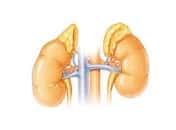In order to fully understand the meaning of the term gland, it is necessary, first of all, to know its etymological origin. In this case, we can establish that it derives from Latin, specifically from “glandula”, which is the diminutive of “glans, glandis” which means “acorn”.
This is the name given to an organ dedicated to secreting some type of substance that is useful for the body.
 The secretion of the glands can be expelled through the mucous membranes or skin or directed into the blood . The substance released by a gland can generate a certain effect in the environment to which it reaches or be directed towards a particular type of cell.
The secretion of the glands can be expelled through the mucous membranes or skin or directed into the blood . The substance released by a gland can generate a certain effect in the environment to which it reaches or be directed towards a particular type of cell.
When the gland does not pour substances out through a duct , but rather sends them into the blood capillaries, it is classified as an endocrine gland . This is the case of the glands that produce hormones , which are substances dedicated to regulating, inhibiting or exciting the activity of the organs. The pineal gland , thyroid gland , adrenal glands , hypothalamus , and pituitary gland are endocrine glands.
Exocrine glands , on the other hand, generate non-hormonal substances that they expel through tubes to the surface of the body, an organ or a cavity. The lacrimal gland , the sebaceous gland , the sweat gland , the mammary gland and the saliva gland are part of the set of exocrine glands.
It should be noted that there are glands that develop both types of secretion (endocrine and exocrine): the so-called mixed glands , as the pancreas and liver are usually described.
In the same way, we cannot ignore another important series of glands that exist in the body, such as the following:
-Bartholin's glands, which are found on the sides of the vagina and whose main function is the lubrication of that area of the body.
-Pituitary gland, which is located at the base of the brain and is responsible for producing hormones that are essential both in the set of functions of other glands and in growth. So important is it that it is considered the main gland of the entire body.
-Prostate gland. As its name indicates, it is located in the prostate area, specifically below the bladder, and its function is none other than to help produce the liquid that it transports and nourishes the sperm.
-Parotid gland, which is of the salivary type, which is considerable in size and is located on both sides of the face. The external jugular vein originates from it, produces a large amount of saliva and has the peculiarity that it is crossed by several nerves and also by the external carotid artery.
It is important to mention, finally, that glands are also present in plants . Its function, as in animals, is to generate secretions. There are plant species that have salt glands , to cite one case.
